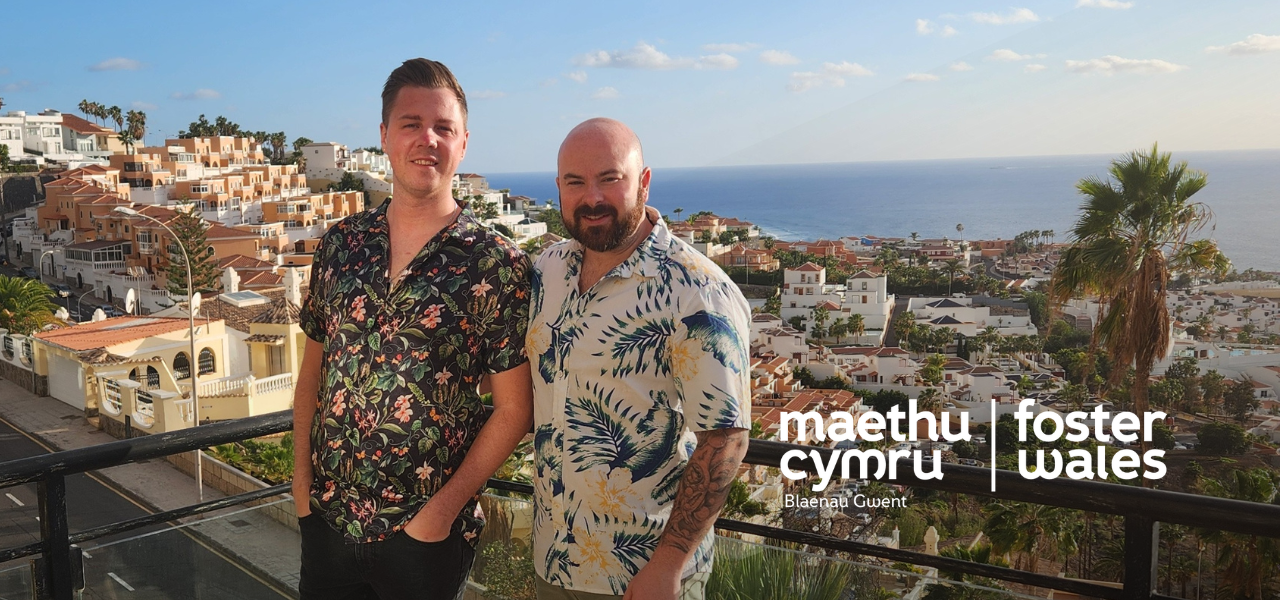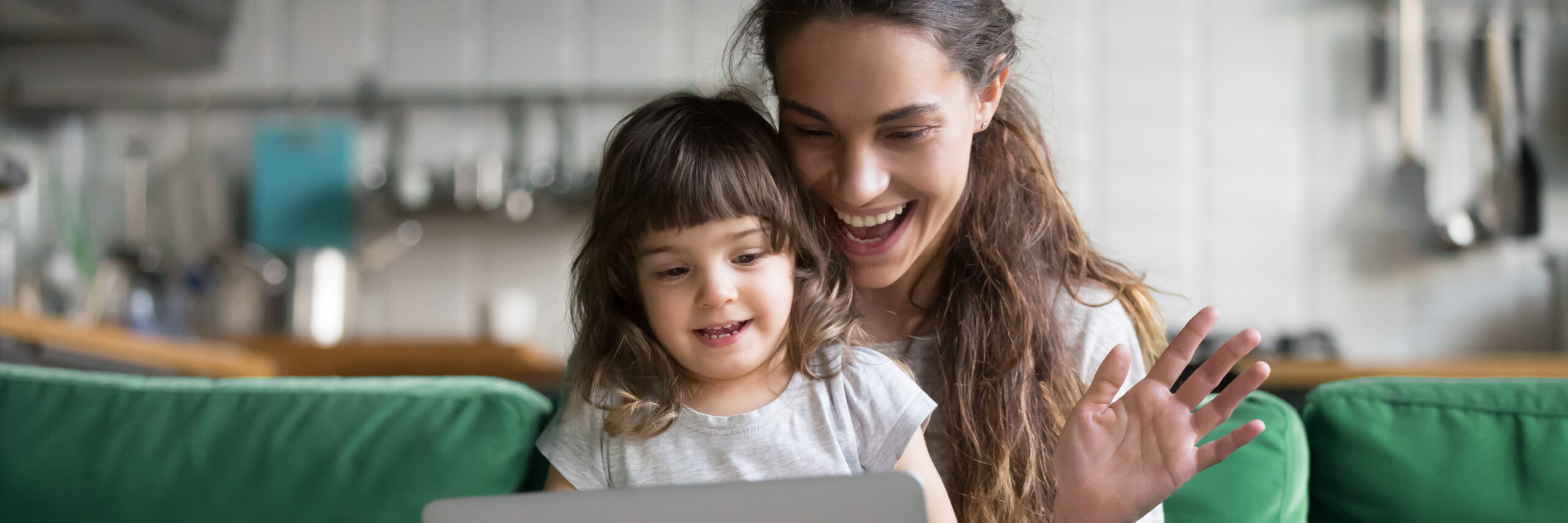
Aaron and Matte became foster carers with Foster Wales Blaenau Gwent 8 years ago. Aaron was only 23 and Matte 25 when they decided to foster. They have fostered 18 children to date and are currently looking after 3 children.
We spoke to them about their fostering experiences and wanted to know more about why they decided to become foster parents and what it means to them.
When we had our first foster child we fell in love with fostering.
Aaron’s and Matte’s journey into fostering started when the couple signed up to be a support network for Aaron’s mother, who is a foster carer herself.
Aaron said, “It was just like a natural progression for us because I was brought up with my mum having foster children in the house. Then when we got together, we moved out within 5 months, and we got our own place. It was quite a natural thing to support my mum which is what I was doing anyway when I lived at home.”
When the couple moved into a larger property, Aaron’s mother encouraged them also to become a foster family. In 2016, they welcomed their first foster child, who was 9 then, and they eventually became her special guardians.
Matte said, “People asked us why we don’t go into adoption instead, and our response at the time was that our relationship was still relatively new, and we were very young getting into it. When we had our first foster child we fell in love with her, and we fell in love with fostering. We felt like this is our calling for now.”
Foster carers must be able to adapt.
Foster Wales’ 2024 campaign, “Bring Something to the Table,” aims to demonstrate that most people have the necessary qualities to become foster carers. Skills and characteristics that would make someone a great foster carer include patience, empathy, and adaptability, among many others.
Aaron and Matte agreed that being a foster carer requires ability to adapt to changes in one’s daily life. Short-term or emergency placements may require quick adjustments to your routines, and foster carers must be willing to do so. Especially in the early stages when a child arrives, foster parents need to be ready to potentially sacrifice certain events or plans to allow for an adjustment period and help the child settle into a new environment.
“I think anybody can foster if they have the right mindset. You have to be willing to compromise.”
The rewards of fostering make it all worthwhile.
Asked about the impact of fostering Matte said, “Fostering taught us a lot. It made us more aware of what so many children are going through. Aaron had seen more of it as a child, but I lived quite a sheltered life growing up. My life was ‘rainbows and butterflies’, so fostering opened my mind to the other side of it. It made me a stronger person, but also taught me to accept my emotions and that I can cry and not feel ashamed of it.”
After fostering for 5 years Matte felt motivated to pursue his degree in Psychology with Behaviour Analysis to learn more about the human brain and understand children even better. Currently working as a dad’s support worker for the Local Authority he feels that fostering made everything in his life fall into place.
“Fostering helped me sculpt my future and my career as well as set the path for my life. 11 years ago, I was travelling the world not knowing what to do in life. Today I feel that my life has purpose.”
Another reason fostering is rewarding for Aaron and Matte is that they see positive changes in the children who leave their home and how fostering impacts young people. The couple maintain contact with 80% of the children they have fostered.
“One child we fostered, she is now in university, sends us Father’s Day cards and presents every year; it’s really nice. She always comes back from uni to see us, and even though we only fostered her for a short time, she told us that we made a massive impact on her life.”
Matte added, “Recently we saw a boy in town who stayed with us only for 2 weeks. He has transitioned now into adult life. When he recognised us, he said he never had a chance to say, ‘thank you’ and how comfortable he felt in our home. This is an incredible reward, to know that we could help these young people.”
The biggest challenge is seeing them go.
Matte said that what’s great about being a foster carer is that you’re constantly learning and adapting. Every child is different and brings new and interesting (sometimes challenging) experiences. It makes you grow and develop skills almost daily, and you also surprise yourself and discover new things about yourself. It can be tough at times, and not everything always goes as one imagined, but Matte said, he likes it when it’s not easy and he enjoys finding solutions to problems.
When asked about the greatest challenges of fostering, the couple concurred that the most daunting part is letting the children go. When you have cared for children for a significant amount of time, it is natural to develop a strong bond and become attached to them.
“The biggest challenge is seeing them go, it’s a happy time when we see them happy, but at the same time it is sad and we know we will miss them,” said Matte.
Aaron added, “Every time the child leaves it takes a piece of us with them.”
Make teens feel understood and valued.
The couple are open to fostering children of any age. When asked about fostering stereotypically ‘challenging’ teenagers, they responded that they have loved every single teenager who came to their home.
“They are probably the easiest ones, to be honest! They need some structure and routine. We treat them very fairly, and we are very clear about what our house rules are and what we expect, which is mutual respect, sticking to certain routines etc. But the main thing is to enjoy it and have fun and so far it has worked for us!”.
For some young people, who are going through the uncertainty of being a teenager or may be confused in life, the couple can be an example of living a happy life against any odds.
“We are living proof that you can be part of the LGBTQ+ community and still live like any other person and do what any other person does.”
Their open-mindedness and young age helped them relate to teenagers as older brothers rather than parental figures. Teenagers dislike having strict rules and restrictions imposed on them, so approaching them as equals makes them feel understood and valued.
“This is our life.”
Fostering experiences are deeply personal and unique to each individual. Every foster carer has a different story to tell, and each approach to fostering is shaped by personal experiences and values. For Aaron and Matte, fostering holds a special place in their hearts as they embrace the challenges and joys of providing care and support to children who need it.
“It makes you get up, do all the paperwork, prepare meals, attend meetings, it’s a 24-hour job, but we would never call it ‘a job’. This is our life. These are children living a normal life with us. We go on holiday together, and we don’t get ‘annual leave’ even though we are entitled to a break. But we chose it and we treat these children as our own. It’s a family, so when we go on holiday they go with us, and we all have fun.”
They create a nurturing, warm, and secure family environment where every child feels equally supported and loved. They advocate for and stand by the children at all times, and also ensure that all the children are included in family events.
“The youngest child we had was going to be adopted in August and we were going to Disneyland in September. The adoption was delayed until January, so we were running around trying to get her booked on a ferry and sort all her paperwork and documents. She ended up coming with us, and totally made it for us. She was only 5 and everything excited her so much, everything was magical for her. She made the trip even better for us! We absolutely love travelling with the kids, as they are so excited and seeing their joy makes us happy.”
We feel valued and respected.
The couple have a big support network around them, with friends becoming like ‘aunties’ and ‘uncles’ to their foster children. These connections often endure even after the children leave their home.
They praised the fostering community in Blaenau Gwent and mentioned that although face-to-face meetings were affected by the Covid-19 pandemic, they found support through online chat groups and forums, which provided practical advice and made them feel less isolated.
“We have been very fortunate to receive fantastic support. Our link worker is amazing; she is always available when we need to speak with her, and she is genuinely interested in our well-being, always offering support. We are also lucky that there haven’t been many changes in the team, so there is continuity.”
Aaron added, “In recent years we also see that many social workers have genuine interest in our opinions, how we see things and they treat us like equals, like professionals who know equally a lot, if not more, about children, as them. This makes us feel valued and respected.”
Fostering moment that stuck with us.
This year’s theme for Foster Care Fortnight was “Fostering Moments.” I asked Aaron and Matte if they could recall a specific moment from their fostering journey that had a lasting impact.
“Our foster daughter gave us away on our wedding day – this was the most special moment for us.
We took guardianship of her after 4 years of having her. We announced to her at Christmas, that she would stay with us permanently and take our surname. We got married in February just before lockdown and I think it’s our biggest achievement and accomplishment, that she could be there with us on our special day.”
At their wedding, Aaron spoke from the heart about their love for fostering and pledged that they would keep fostering for as long as they possibly could. Their enthusiasm and joy that comes from being foster parents shine throughout in our conversation.
Make that first phone call or have that first home visit.
If you’re thinking about fostering, contact your local authority fostering team, Foster Wales. The team will be able to talk to you about fostering and answer any questions you have. There is no obligation to process into an application, but you will know if fostering fits your lifestyle and circumstances.
The couple said,
“Just do it! Make that first phone call or have that first home visit. You’ve got nothing to lose by contacting the local authority and finding out more information.”
Thinking of becoming a foster carer, like Aaron and Matte?
If you live in Wales, visit the Foster Wales website where you can find all the information and contact your local authority service.
Living in Blaenau Gwent, Wales? Send us a message or give us a call on 01495 369620 and we will get back to you as soon as we can.

